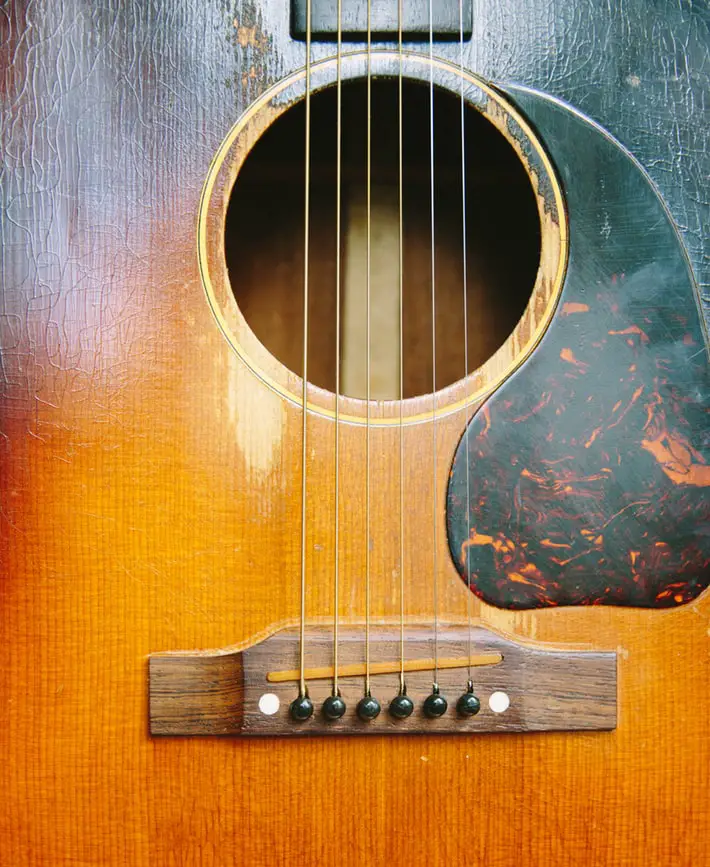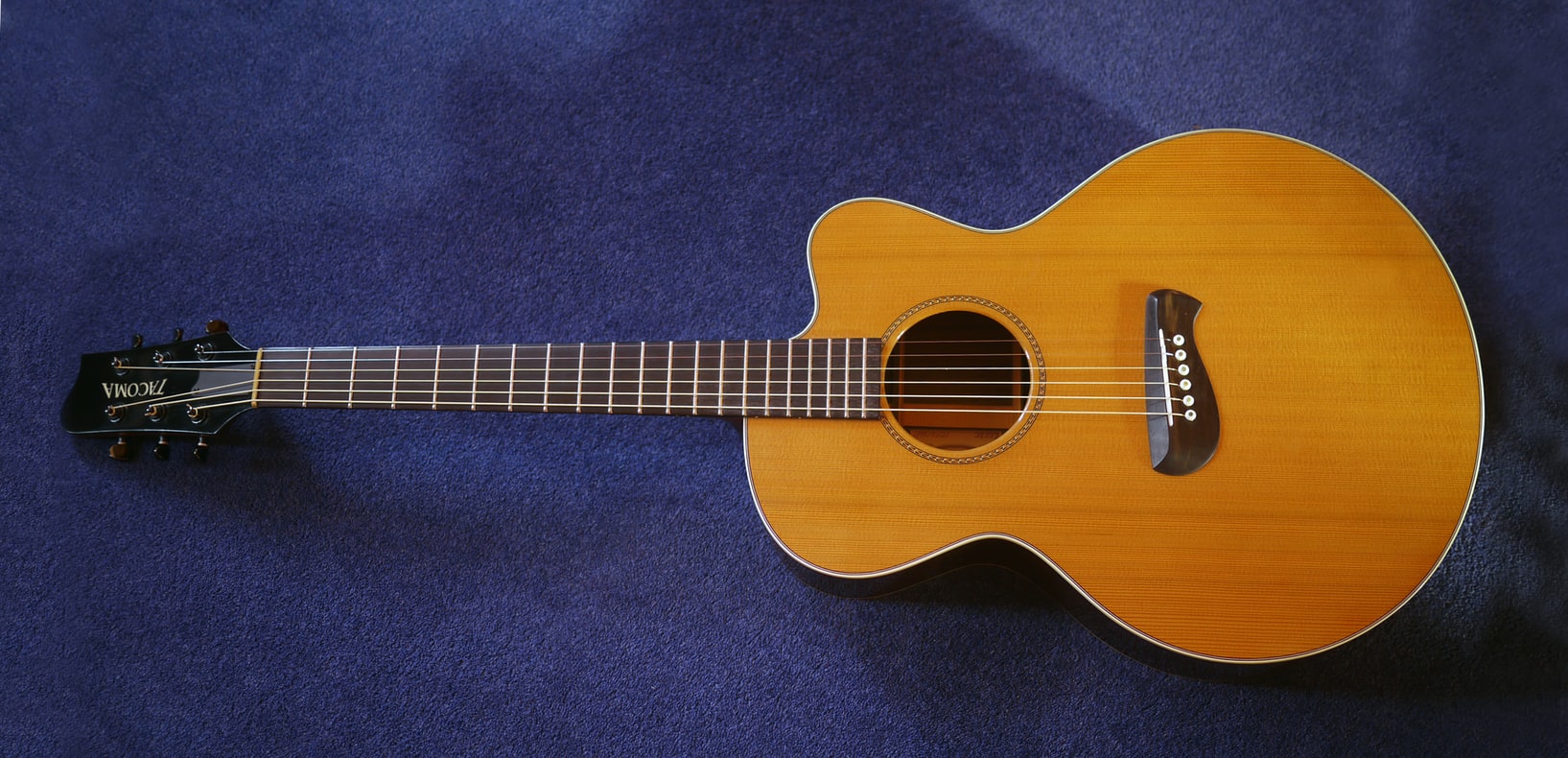We often hear beginners always ask “how often should I change my guitar strings?” But the answer to that question isn’t so straightforward. There are different factors that determine how often you should guitar strings and we’re going to talk about all of them today.

If you’re looking for a more direct answer, however, the general advice is that as a beginner, you should change your strings every three months or after 100 hours of practice. Although, your strings can last double that and still sound fine.
Table of Contents
Factors That Determine How Often To Change Your Guitar Strings
Corrosion
Corrosion is a gradual destruction of metal as a result of the combination of atmospheric oxygen and moisture. Go into your garage and pick up a few metals you haven’t used in a while, you’ll see that they have started to break and aren’t as structurally sound as they were.
Because most guitar strings are made of steel (which is a metal), the same chemical reaction affects them.
Atmospheric oxygen naturally occurs in the atmosphere and your fingers produce enough moisture over time. The two main ingredients that cause corrosion are readily available to your guitar strings. So, it is only a matter of time before they begin to corrode.
Once your strings get to this point, there’s no saving. They need to be replaced immediately.
Now, corrosion doesn’t happen at the same rate for every string. If you sweat more than normal, your strings would corrode a lot faster than someone who almost doesn’t sweat at all.
If you’re a big sweater, you don’t need to worry too much. There are two main ways you can extremely slow down the process of corrosion so you don’t have to buy new strings every other week.
1. Buy A Coated Guitar String
Metals use coating as a measure to drastically reduce the effect of corrosion. The same can be applied to strings. There are coated guitar strings you can buy that definitely last a lot longer than normal strings.
Here are a few you can check out:
2. Getting A String Cleaning Kit
Another way you can increase the lifespan of your guitar strings is by cleaning it with a special string cleaning kit after every playing session. You can also use mineral oil and a rag to wipe the strings.
How Often You Play

This is also a very huge factor that affects how often one should change their strings. And considering the other varying factors, here are rough estimates on how often to change your guitar strings by the amount of time you spend playing it.
Less Than 15 Minutes A Week
If you have to keep your guitar in its box for the most part and you keep the box dry, chances are high that it won’t get any moisture that would cause corrosion. Also, because you’re not playing it so often, the strings keep their tensile strength for longer periods.
If you’re “the infrequent guitarist”, then you only really need to change your strings once a year. Even though they aren’t played often, as long as you’ve played them once, there’s enough moisture to begin the oxidation process. So they won’t last forever.
1-3 Hours A Week
This is probably the stage you would be at as an absolute beginner. You’re just learning the ropes, or strings, lol. And everything is still kind of new to you. Let’s say you only practice 30 minutes a day when you’re at guitar practice.
If that’s you, then you would need to change your strings once every 6 – 8 months. At this stage, you probably have no idea about how to change your strings. But we’ve got you covered:
Click here to read our article on How To Restring Your Guitar.
3 – 12 Hours A Week
At this stage, playing the guitar is most likely already a hobby for you. You’re picking up the guitar almost every day and you’re going for 2 hours at a stretch sometimes.
Most beginners and intermediates fall into this category. For this, you would need to change your guitar strings anywhere between 2 – 6 months.

12 – 25 Hours A Week
At this stage, most guitarists are nearing the end of their intermediate career and are ready to become professionals. In fact, some would even call them professionals at this stage. You’re already going for paid gigs and concerts so there is an increased need to keep your strings extra fresh.
At this stage, you’re probably playing every single day anywhere between 3 – 5 hours. That’s a lot for your strings to cope with. Because of that, you would need to change your strings pretty often. You’re looking at between 1 – 2 months. It can even be within a month, for some.
30+ Hours A Week
At this level, you would naturally be able to tell how frequently you should change your strings. Because of how often you play the guitar, you should definitely be looking at changing it once a week, and then before any major gig.
- Acoustic guitar strings constructed with 80/20 (80% copper, 20% zinc) bronze wrap wire
- Played for a crisp, bright tone with an expressive, vibrant presence
- Ultra-thin NANOWEB Coating provides a more traditionally textured, “uncoated” feel
- Our patented coating technology protects against common corrosion, extending tone life longer than any other brand’s coated or uncoated strings (Elixir Strings player survey)
- Light gauge: .012 .016 .024 .032 .042 .053
Prices pulled from the Amazon Product Advertising API on:
Product prices and availability are accurate as of the date/time indicated and are subject to change. Any price and availability information displayed on [relevant Amazon Site(s), as applicable] at the time of purchase will apply to the purchase of this product.
Money
Although we might not want to say it, money is still a huge factor that determines how often anyone would change their strings. As much as it’s nice to change it every week, good strings are not cheap.
As a professional musician, you’re already earning money for your music and so this shouldn’t be a problem. However, as a beginner, you’re still investing all of your personal money into this hobby and you’ve not gotten any returns yet.
So, if you can’t afford to change it every three months, then maybe change it every six months. You’ll just need to do the things we mentioned above to make sure that during those six months, the strings don’t lose their tune or ability to play certain techniques.
Conclusion
All these are merely guidelines and are not hard and fast rules. Your strings might last double the time we have listed or half the time. At the end of the day, you’re the only person who can determine whether it’s time to change those strings or not.
Does it look funny? Time for a change.
Does it sound funny? Time for a change.
Is the guitar tuner having trouble registering? Time for a change.
Are the strings losing tune fairly easily? Time for a change.
And most importantly…
Can you afford a set of new strings? Time for a change.

